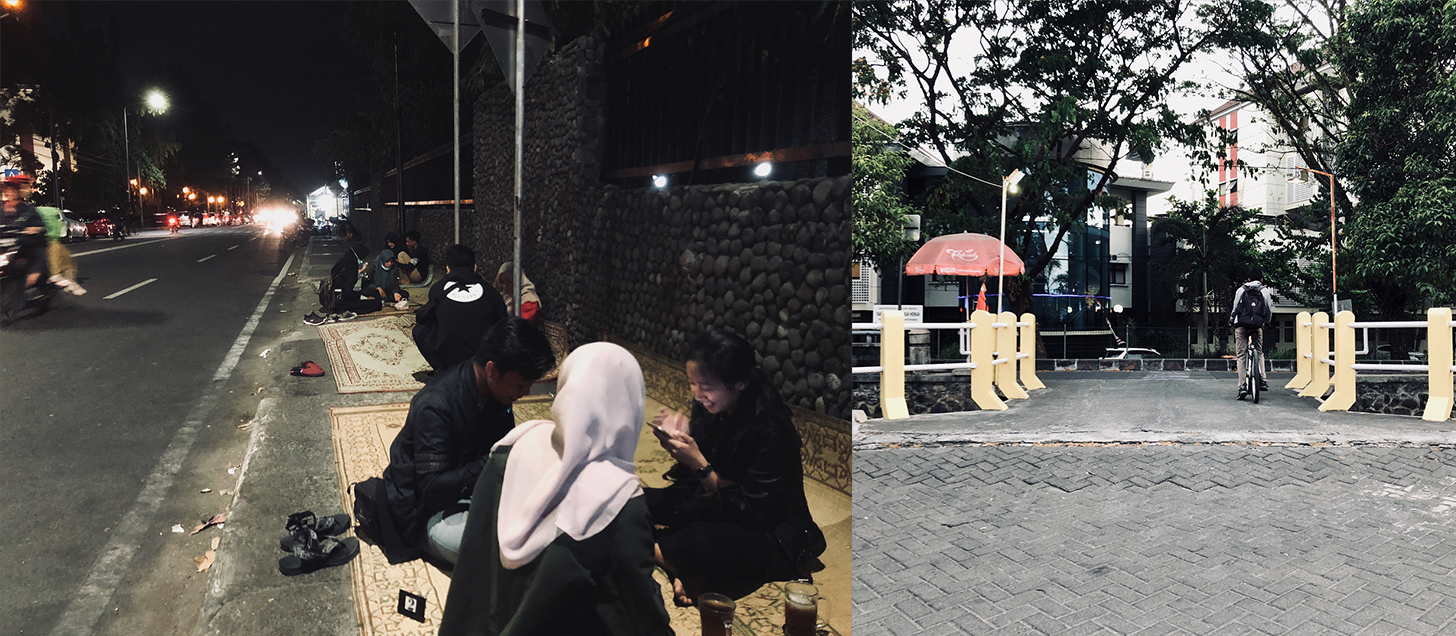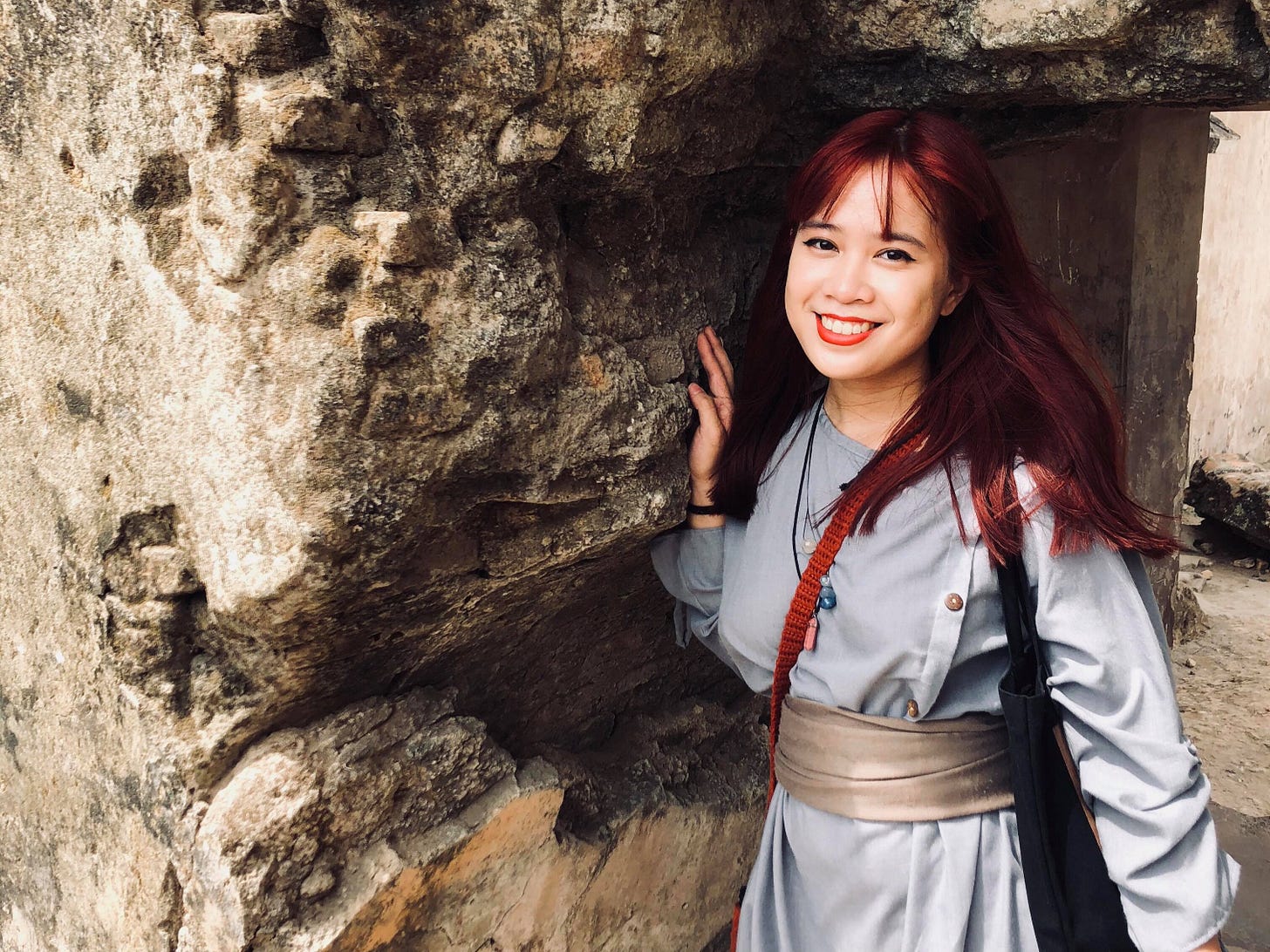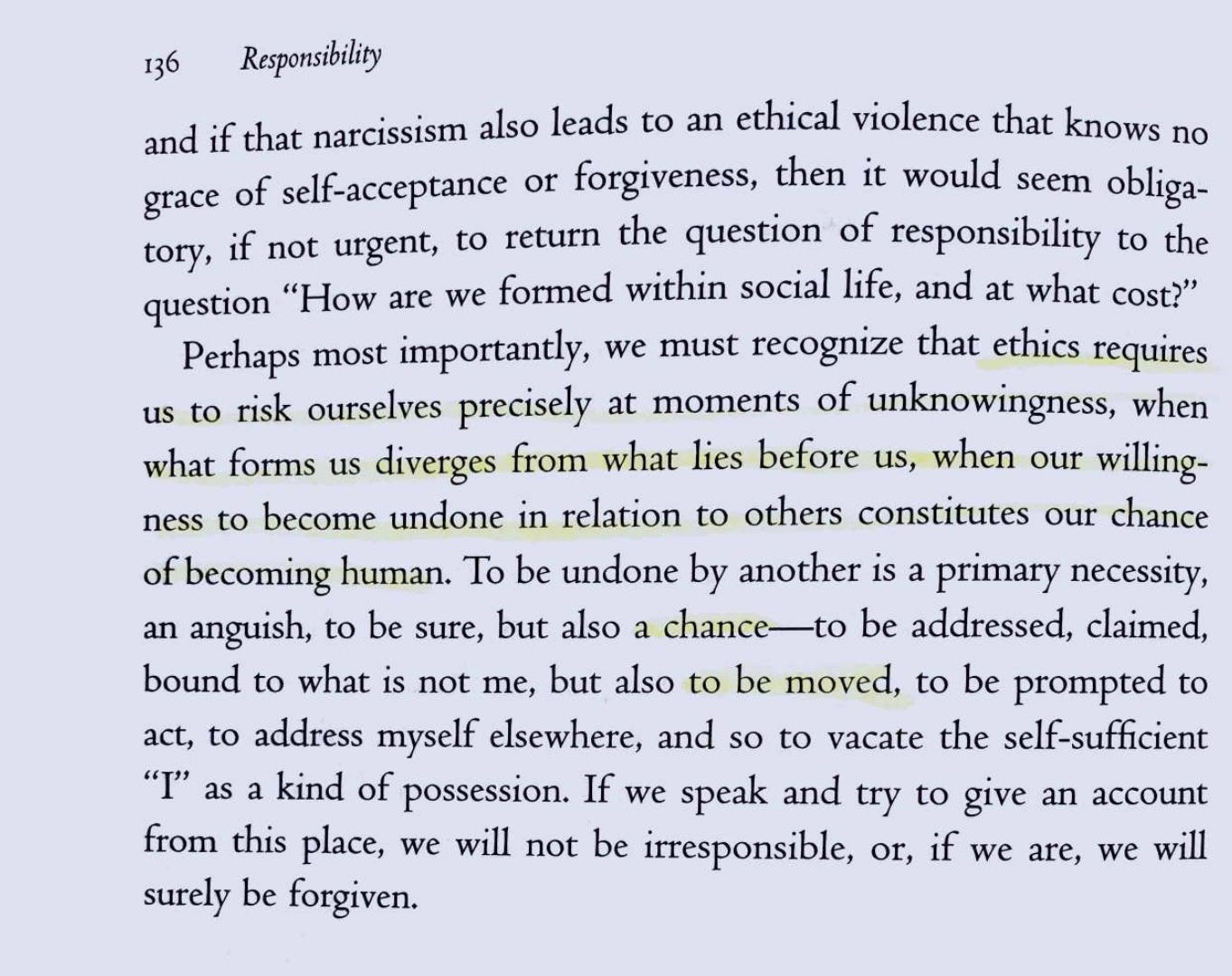Who are we when we are not alone? is how Bhanu Kapil ends “Seven Poems for Seven Flowers and Love in All Its Forms”. To this question, some answers—
I. 2018
When I am not alone, I am walking to dinner with new friends in the streets of Yogyakarta, Indonesia.
It was the first of fourteen days we would spend together as the attendees of a summer school program on Southeast Asian studies. Through the humid evening, we found a warmly lit lesehan—an open-air stall where diners sit on woven mats on the floor to eat—close to the university. It was alive with faint clouds of smoke and the mouthwatering smell of street food lit by bright CFL bulbs. My companions that spoke the language—some locals, some multilingual foreign scholars—kindly guided me through the customs and menu that night, as they generously would in the many nights that followed. Tempe goreng, a sweet and savory fried tempeh dish, came highly recommended.
I was seated next to L. Tall, well-dressed, and effortlessly cool, he navigated the space with a confidence I immediately admired: Fluent in Bahasa Indonesia (on top of four other languages), he conversed with the vendors and our local student guides with ease and familiarity. To everyone, L spoke with genuine kindness, the right amount of humor, and a stunning intelligence that, to me, didn’t seek to impress or intimidate. I observed him keenly that first night, hoping to absorb even a tinge of the social and intellectual finesse he seemed to possess.
As I got to know my classmates during dinner—learned more about the schools they hailed from, their ongoing academic projects, their hobbies—I felt more and more out of place at the program. Like a synthetically red-haired, lipstick-wearing impostor. In that sea of historians and anthropologists, I felt like a silly little literature major who happened to have the fortune of being accepted into the summer school.
In reality, I had nothing to be worried about. Everyone was perfectly lovely, each bright, curious, and knowledgeable in their own way. There was a photographer from Malaysia, a brilliant feminist scholar from Yogyakarta, a number of historians from Melbourne, and a PhD candidate at UC Berkeley, to name a few.
L, in particular, fascinated me, and he returned that curiosity with equal interest. At lectures we often sat next to each other, and during coffee breaks we hovered in the same circles with the other students, many of whom were also Filipino. (Two of them, A and M, would become good friends.) Over chat, L and I exchanged readings and music (my Laura Marling in exchange for his favorite Hokkien song), and kept in touch as we did field work with our respective groups separately. Outside my room, which was tucked into the corner of the hotel all the foreign students were housed at, were two chairs where we spent several free hours talking about each other’s research interests, his hometown in northern China, and how he was pursuing his master’s degree in Seattle soon. I told him about my thesis—then the only academic accomplishment I felt proud of—and my poetry, which he gave kind words and insightful feedback for. Those seats felt, to me, like a world within a world where we got to know one another with a vividness that surprised me. A delicate, sure click, like the sound of clockwork. There and beyond, as we studied, ate, and traveled, he showed a thoughtfulness that always made me feel welcome, safe, and seen. He texted me once from a restaurant he thought I’d like: You should come if you have time. They have vegetarian options too. You eat eggs, right?
That the mutual fondness evolved into an obvious crush should have been predictable. But it was never something we said out loud. For many reasons, I didn’t want to speak it. More importantly, it didn’t need to be anything beyond what it was: a genuine connection, electric, tender, true.
When I think of Yogyakarta, I think of all the laughter I shared with newfound friends from all over the region, the local cuisine that would forever influence my palate, and the cultural and historical sites I was lucky to have seen. I think of L, and the beautiful, evanescent friendship we had that belonged solely to those two weeks I will never forget. Good luck with these new and old lives of ours.
II. 2017
When I am not alone, I am sitting next to my sister at the wake of MP.
By then, I had been crying for days.
Hours before she passed away, MP called me from the hospital while I was in the middle of class. I stepped out into the hallway with a terrible, sinking feeling to pick up the call. Over the phone her voice, once the fiercest, most commanding sounds I had ever known, was weak and hoarse as she asked me how my day was going.
Okay lang—pero, uy, ‘musta ka? I kept my tone steady against the somersaults in my gut.
Ang sakit, Riz, she told me. The day she found out her cancer came back, she knew she wasn’t going to make it; we didn’t want to believe her. Ayoko na.
The struggle to speak was evident. In the next moment, I heard the phone being passed—her sister, who made the call, took back the phone. Gusto niya lang marinig boses mo. Magkwento ka lang, naririnig ka niya.
She will not hear you cry! I commanded myself, breathing deeply, my fingernails digging painfully into my palm as a violent measure against falling apart outside my classroom. You will talk about your day, and that you will see her later.
And I did. My entire family visited her that evening. Her sister, who stayed at her bedside, told us about how MP would say she could see their father, who had long passed away, standing by the doorway, waiting for her. A number of tubes connected her body to bags and machines that, I imagine, both sustained her and kept her in unimaginable pain. In that somber hospital air, we talked to her even though she couldn’t speak. Magkikita tayo bukas, ha? We’ll see you tomorrow. She raised her eyebrows to say, yes.
At around 5 o’clock the next morning, she passed away. My sister, mom, and I got there in time to see her go. I imagined her following her father out the open door, finally free of pain.
At the wake, soon after, I resolved to keep my composure. To keep the outbursts of my grief private. Slowly, friends and acquaintances of hers that I didn’t know arrived to pay their respects and say their goodbyes. The only one I knew was her best friend B, who approached my sister and I to exchange stories about MP—how she probably could have become barangay captain if she wanted to, how she loved playing bingo on Sundays, how she babied our dogs Sirius and Tomi with a softness that surprised everyone around her. There was light laughter as we recalled some of our fondest memories of this incredibly tough, formidable woman who was afraid of nothing—except ghosts, but I would be too if, like her, I had the ability to see them.
And then B told us about the most tender gesture that immediately broke my meticulously crafted composure. Alam mo, B began, pupunta dapat kami sa Starmall ngayong linggo. Oh, why, my sister and I asked. Bibilhan niya dapat kayo nung medyas na Pikachu. Alam niyang hilig niyo ‘yun.
I loved her so, so deeply. We all did, but love does not negate the truth: MP was our kasambahay. I want to say she was family, but no matter how lovingly I intend to say that, the reality was that the relationship was a lot more complicated than that. For a long time, she was employed by my parents to help with domestic work, which largely included raising my siblings and I. Because of that, I have no childhood memories of home that do not have her in it—the lasagna she would cook on special occasions, her worn-out crossword booklets on the kitchen table, the din of her early morning conversations with my mother that, to someone who didn’t speak Bisaya, sounded like heated arguments, the family Christmas party raffles she was always lucky at. When I moved into an apartment in college, it was MP who helped me settle in. She gifted me a rainbow plastic feather duster for the unit, and taught me her method for cleaning the bathroom. To her I owe many, many things I fear I didn’t thank her enough for.
Her dream was to open a sari-sari store in Surigao. In truth, I don’t know if she stayed in Manila with us longer than she wanted to, or if she had still been waiting for the right moment to return home. She said she wanted to wait for my sister to graduate from college, but I wish I had asked about it more. What I do know is that she thrived wherever she found herself in—the social world of our barangay, my parents’ bakery that, for a few years, became the focus of her work, and, ultimately, the house we shared; our home. The time she had given us, with all its implications and complications, is something I wish to honor forever.
III. 2021
When I am not alone, I am fantasizing about moving to Austin with someone I just met.
There was a sense of serendipity in the air as J and I sat at the patio of Mozart’s Coffee. It was a gloomy May day, and when we woke up that morning, in the third Airbnb we stayed at together within a two-week period, J and I decided to shake off our cabin fever by spending the afternoon at a café.
Let’s move here, J said. An invitation and a wish. We could make it work.
By that point we had known each other for less than a month. We met as housemates in another Airbnb property in South Austin a few weeks back when Michael and I decided to stay in the city to be proper tourists. J had already been living at the house for a while when we arrived. That she was Filipino-American instantly gave us common ground, but it was her warmth that drew me in—she was magnetic. Before Michael and I had even settled in, the three of us immediately fell into conversation at the shared living area of our temporary home.
Born and raised in California, J was a professional dancer and actress based in LA. She and her siblings all pursued careers in entertainment—her older brother was a famous musician, especially within the Fil-Am community—and she had spent the last few months developing her craft through constant workshops and auditions. Like me, J was in Texas for someone special.
With that strong, initial bond, we spent most of the week together. She took Michael and I dancing several times—first, to a nightclub along South Lamar, then to a salsa under the stars event at Zilker Park. If it hadn’t been for her, I may have never learned salsa, or discovered the thrill of dancing with strangers. One night, we watched the 1984 Dune at a drive-in theater, and on another day we walked for hours around Town Lake, played We’re Not Really Strangers at home, and—with Michael back at work—J and I visited the Blanton Museum of Art with C, another visiting friend of hers. But most of the time, we just talked at different spots in the city—about our beliefs, about love, about our dreams. From J I learned so much about bravery.

By the time she pitched the preposterous but seductive idea to live in Austin together, to split the cost of an apartment in the city, we had gone through quite a number of adventures already. We could make it work, I thought. Maybe my return flights kept getting cancelled for a reason (during this visit, which went from being a short, month-long trip to a five-month stay, my flight was cancelled three times). J was thinking about how she could continue pursuing an acting career from Austin while I explored, in my head, possible work opportunities as a Filipino national with a US tourist visa. I’m sure I could figure it out. Why the hell not? I drafted a list of bookstores and small companies that might have been open to sponsoring a work visa, and prepared the speech to my family and friends about my unexpected decision not to come home. J had planned to talk to the resident artist at Mozart’s, who happened to be playing that afternoon, while I started to imagine my life as an immigrant in one of the most expensive cities in the United States. Sure, moving in with a new friend was risky and absolutely irrational—but it also made me feel alive. Wasn’t that the point of it all?
Alas, it was only a spell. Reality caught up with us not long after—J couldn’t just walk away from LA, and I, for legal, financial, and personal reasons, couldn’t simply stay in a foreign country without prior preparation. We were quiet for a while as the cloud of our shared illusion dissipated. In its wake was the clarity of our lives made, for a moment, magnificent by the music—
We said our bittersweet goodbyes days later. The bubble of our accidental vacation together had burst, and we were left with the foundations of a long, wonderful friendship—a gift, really. Months and years after, J and I would continue to stay in touch, exchanging stories about some of the most important moments of our lives. I love you, friend, we would say over video calls spanning multiple time zones. Her bravery has taken her to Broadway, and into a flourishing relationship I couldn’t be happier to see. Inspired by her, mine has taken me here, to a tiny house in Johnson City, writing in the tender silence woven from all the love I’ve gained, lost, and regained my entire life.







